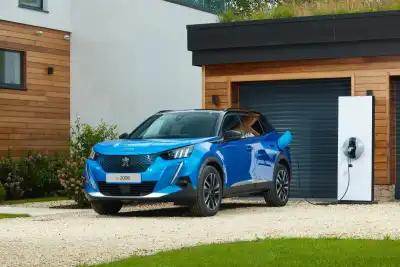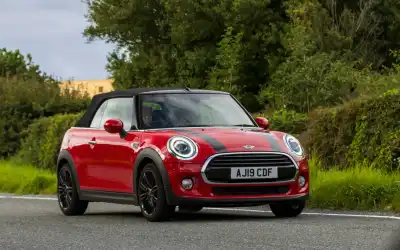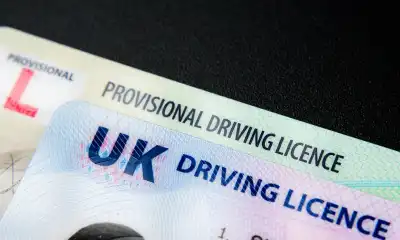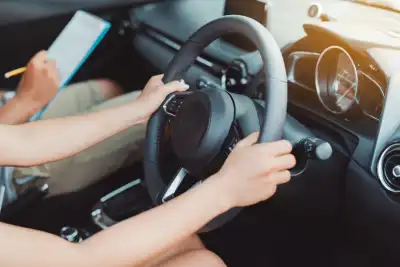
If you're a new driver—or about to become one—it's worth knowing the most common mistakes that trip people up early on. Everyone starts somewhere, and it’s not about judging. It’s about learning from others so you can avoid costly, stressful, or even dangerous missteps on the road.
Here are the most common new driver mistakes in the UK to watch out for:
1. Using Your Phone While Driving
- This one’s a biggie. Using your phone at the wheel—whether texting, taking a call, or fiddling with it in a cradle—is one of the fastest ways to lose your licence.
- In 2022, 27,000 drivers were caught using their phones while driving (AA / Home Office).
- The penalty: 6 points and a £200 fine.
- New drivers face an immediate licence revocation if they hit 6 points within the first 2 years.
- Even if your phone is mounted, distractions are still risky. Keep it out of reach and out of mind while driving.
2. Overconfidence
- Confidence is good—but overconfidence can be dangerous.
- 1 in 5 new drivers crash within a year of passing (Brake).
- Familiar routes (like your commute or drive to a parent’s house) are where people often let their guard down.
- Overconfidence can lead to speeding, tailgating, or reacting slowly to sudden changes.
- Stay focused and never assume you're too experienced to make a mistake.
3. Lack of Confidence
Being too nervous can also cause problems. Hesitation at junctions, slow reactions, and second-guessing your decisions can frustrate other drivers and create risky situations.
If you’re unsure on the road:
- Use P plates to signal you're new—they can help other drivers be more patient.
- Practise at quieter times of day or in low-traffic areas until you’re more comfortable.
4. Driving Under the Influence
- This should go without saying—but sadly, it’s still an issue.
- On average, 549 people die each year in drink-driving incidents (Quittance).
- Penalties include: up to 6 months in prison, unlimited fines, and a 1-year driving ban.
- Drugs (including prescription ones that cause drowsiness) and sleep deprivation also count. Driving tired can be as dangerous as driving drunk. If you haven’t slept in 24 hours, your reactions can mirror someone with a 0.1% blood alcohol level.
5. Not Adjusting to Road or Weather Conditions
- Speed limits are not always safe speeds.
- Stopping distance doubles in the wet and increases tenfold on ice (AA).
- Driving at 60mph on a muddy country road or in heavy rain isn’t just risky—it’s reckless.
- Adapt to the conditions: slow down, increase your following distance, and be extra cautious when visibility or grip is poor.
6. Speeding
- It’s not just about going over the limit—it's about going too fast for the environment.
- Speeding or going too fast for the conditions was a factor in 27% of fatal crashes in 2022 (RoSPA).
- Penalties start at 3 points and a £100 fine, but extreme speeding (100mph+) can lead to an instant ban.
- Even 5mph over in the wrong place can be the difference between stopping in time—or not.
7. Carrying Distracting Passengers
- Whether it’s loud music, shouting, or excited friends, passengers can be a major distraction.
- Rule 148 of the Highway Code warns against arguments or distractions in the car.
- You’re responsible for the environment inside your vehicle—if it’s not calm, it’s not safe.
- Let your passengers know you need to concentrate—especially if you’re still building confidence.
8. Poor Lane Discipline & Roundabout Confusion
- Roundabouts can be intimidating, but the rules are simple once you get the hang of them:
- Use the left lane for exits at or before 12 o’clock (unless marked otherwise).
- Always check road signs and markings.
- Missed your exit? Don’t panic—just go around again.
- Make sure you’re in the correct lane early, and always signal clearly.
9. Bad Indicating Habits
- Indicators are for communication—but only when used at the right time.
- Signalling too early (especially when passing a turn you don’t intend to take) can confuse others and lead to accidents.
- Always indicate after passing the first turn if you’re taking the second.
- The goal is to be predictable and easy to read for other drivers.
10. Neglecting Vehicle Maintenance
- Your car needs regular attention, especially older models.
- Low tyre tread, worn brakes, broken lights, or rust damage can all lead to dangerous failures.
- Routine checks and servicing are cheaper in the long run than emergency repairs—or breakdowns.
- Learn a few basic maintenance tips (like checking oil, coolant, and tyres), and get your car inspected by a mechanic regularly.
11. Poor Parking
- It’s not life-threatening, but it is frustrating—for you and others.
- Holding up traffic because you’re struggling to park? Practice more.
- Find a quiet car park and work on your reverse and parallel parking until you’re comfortable.
- Confidence comes with repetition.
Final Thoughts
Making mistakes as a new driver is normal—but the key is to learn from them quickly, or avoid them entirely where possible. Driving comes with real responsibilities, and being alert, sensible, and proactive helps keep everyone safer.
If you're nervous, consider using driver safety accessories (like dash cams or parking sensors), and don't be afraid to ask more experienced drivers for advice.
You’ve already done the hard part—passing your test. Now it’s about building safe, smart habits for life on the road.




